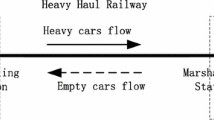Abstract
By proposing the concept of timeline, transform dynamic vehicle scheduling problem into a series of static vehicle scheduling problems. With the objective function of benefit maximization, the cloud preference model of dynamic empty car scheduling is built considering empty car delay time constraint. The non-dominated antibodies are proportionally immune clonal according to their cloud preference, which are defined by their cloud application preferences. It is beneficial to enhance the forecasting accuracy of the immune gene manipulation, and to increase the speed of finding the optimal solution based on the application preference. Experimental results conclusively demonstrate the efficiency and effectiveness of the improving system availability, load balancing deviation and valid time brought by the proposed algorithm in cloud computing environments, conditions and that more close to the reality, empty car scheduling model for specific time was established.

Similar content being viewed by others
References
White, W.W., Bomerault, A.M.: A network algorithm for empty freight car allocation. IBM Syst. J. 8(2), 147–169 (1969)
Milenković, M.S., Bojović, N.J., švadlenka, L., Melichar, V.: A stochastic model predictive control to heterogeneous rail freight car fleet sizing problem. Trans. Res. E 82, 162–198 (2015)
Joborn, M., Crainic, T.G., Gendreau, M., Holmberg, K.: Economies of scale in empty freight car distribution in scheduled railways. Trans. Sci. 38(2), 121–134 (2004)
Lu, G., Cheng, B., Wang, Y., Lin, Q.: A car-following model based on quantified homeostatic risk perception. Math. Probl. Eng. 2013(6), 165–185 (2013)
He, B., Song, R., He, S., Xu, Y.: High-speed rail train timetabling problem: a time-space network based method with an improved branch-and-price algorithm. Math. Probl. Eng. 2014(1), 1–15 (2014)
Bektaş, T., Crainic, T.G., Morency, V.: Improving the performance of rail yards through dynamic reassignments of empty cars. Trans. Res. C 17(3), 259–273 (2009)
Milenković, M., Bojović, N.: A fuzzy random model for rail freight car fleet sizing problem. Trans. Res. C 33(33), 107–133 (2013)
Shi, T., Zhou, X.: A mixed integer programming model for optimizing multi-level operations process in railroad yards. Trans. Res. B 80, 19–39 (2015)
Qiea, I.: Quantum-inspired evolutionary algorithm for continuous space optimization based on multiple chains encoding method of quantum bits. Math. Probl. Eng. 2014(9), 166–183 (2014)
Yang, S., Wang, M., Jiao, L.: Quantum-inspired immune clone algorithm and multiscale Bandelet based image representation. Pattern Recogn. Lett. 31(13), 1894–1902 (2010)
Dong, W., Liu, X., Li, Y.: Analysis of stiffened penstock external pressure stability based on immune algorithm and neural network. Math. Probl. Eng. 2014(11), 1–11 (2014)
Wu, T., Hou, R., Chen, Y.: Cloud model-based method for infrared image thresholding. Math. Probl. Eng. 2016(1), 1–18 (2016)
Gu, J., Gu, M., Gu, X.: A mutualism quantum genetic algorithm to optimize the flow shop scheduling with pickup and delivery considerations. Math. Probl. Eng. 2015, 1–17 (2015)
Acknowledgements
This study is supported by The National Natural Science Foundation of China (61403022); Supported by Beijing Natural Science Foundation (J160003); Supported by the Fundamental Research Funds for the Central Universities (2017JBM030).
Author information
Authors and Affiliations
Corresponding author
Ethics declarations
Conflicts of interest
The authors declare that they have no conflict of interest.
Rights and permissions
About this article
Cite this article
Jing, Y., Liu, Y. & Bi, M. Quantum-inspired immune clonal algorithm for railway empty cars optimization based on revenue management and time efficiency. Cluster Comput 22 (Suppl 1), 545–554 (2019). https://doi.org/10.1007/s10586-017-1292-7
Received:
Revised:
Accepted:
Published:
Issue Date:
DOI: https://doi.org/10.1007/s10586-017-1292-7




